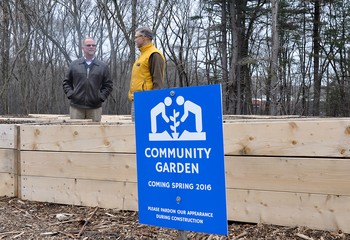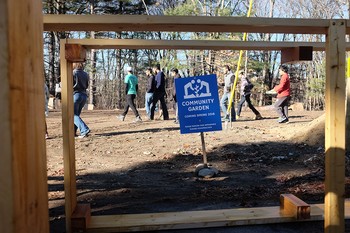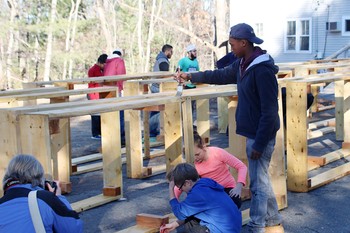When the Rev. Eric Markman became pastor of Hartford Street Presbyterian Church in Natick, Mass., five years ago, several members warned him not to do anything with the church’s land. Hartford Street Presbyterian had been through a difficult and ultimately unsuccessful effort to create low-income housing on part of its nine acres of land-locked property.
But in Markman’s mind, the land didn’t belong to the congregation. “This is Christ’s property,” Markman says. “This is not ours. It needs to serve the community in some way. How can we do that?”
During the past two years, Markman and the congregation have answered that question. The church, along with the Town of Natick and several faith communities, have created a community garden. The first crops in the 55 raised beds will be planted shortly after Mother’s Day.
New Beginnings led to purpose
Hartford Street Presbyterian is a deeply diverse congregation, with members from Cameroon, India, Poland, South America, Canada and parts of Asia. It is diverse economically as well. While some live comfortably on six-figure incomes, others live on Massachusetts’ paltry bottle return fees, scavenging for 5-cent returnable cans and bottles.
The congregation’s multi-faceted diversity gives members a stronger connection to all parts of the community, and an understanding that a small raised bed in a community garden may provide steady income and a better life for a family.

Eric Markman, pastor, and Michael Fitzgerald, ruling elder and member of Session at Hartford Street Presbyterian Church, Natick, Mass., are shown in the community garden. —Robyn Davis Sekula
The congregation is growing, with 130 members and a very full parking lot each weekend. Michael Fitzgerald, a ruling elder in the Presbyterian Church (U.S.A.) and member of the church’s session, credits the New Beginnings program with helping the church define its sense of mission, and spurred the congregation to create the garden. Hartford Street started the New Beginnings program in 2014.
New Beginnings invites Presbyterian congregations to participate in a discernment process to determine the future and purpose of a church. “As part of New Beginnings, you need to define who you are,” Markman says. “There is a common vision here. We’re not just multicultural. We believe all humans are equal, and that made us feel comfortable working with the Islamic Center of Framingham and Temple Israel. The congregation believes it and lives it out.”
Hartford Street Pres is one of many PC(USA) churches across the country that have used New Beginnings to help them to recommit to reaching their community and neighbors once again, says Ann Philbrick from the Presbyterian Mission Agency Church Transformation office. “Hartford Street has chosen to use the asset of their land and their rekindled love of their neighbors to start this garden,” Philbrick says. “It will be exciting to see where else this takes them."
Forging connections
The project started with Markman meeting with Pat Conaway, founder of Big Heart Little Feet, an organization based in Natick that helps people leave small footprints on the earth. The two discussed options and realized there was a need for a community garden. “Natick is a town of 33,000,” Conaway explains. “It has a pretty robust sports, recreation component, with more than 20 areas dedicated to sports and athletics. It's great for kids, but there was no balance. There were no community gardens.”
Hartford Street Pres was a great fit to help create the gardens because it is consistent with the church’s focus and mission. He credits Markman with leading the church forward. “Eric is a really good community person,” Conaway says. “The congregation is quite diverse and they advocate for a lot of justice issues and sound environmental policies.”
Conaway worked throughout the project with the congregation and the city to help get it done. Jay Ball, a former town selectman who is a long-time member and leader at neighboring Temple Israel, was particularly instrumental at knowing who to contact and how to get things done, Markman says.
“When I need to get something done, I never go angry or upset,” Markman says. “I go very friendly and I take my time. If I need something done, I don’t send an e-mail or make a phone call. I go in person.”
Preparing for mission
The preparation for the garden spot included clearing the land of linden trees, and disposing of utility poles the local power company had been dumping on the land for years. The town also paid the utility company to move a working utility pole on church property.
Students from Joseph P. Keefe Regional Technical School in neighboring Framingham built the beds. The project thoughtfully included some beds that are higher so that those with limited mobility will be able to plant and harvest, too.

A sign for the Natick Community Garden, on the grounds of Hartford St. Presbyterian Church. —Robyn Davis Sekula
Nearly 50 youth and adults from Jewish, Christian, and Muslim congregations around the Natick area gathered last October to apply an organic sealant to the beds. Finally, the Town of Natick’s Department of Public Works placed the beds in the right spots and filled each with organic topsoil. Irrigation lines will allow those tending to the garden to easily access water.
“A Place to Turn” food pantry on Hartford Street Pres’ property and other local food pantries will receive some of the produce grown in the garden.
The garden project was more expensive than the church could afford. By joining with the conservation commission of the Town of Natick, the church got the work done. The church, town, Conaway and other faith groups became important partners in making sure all of the proper permits and permissions were granted.
As Markman sees it, the project isn’t really about food. “That’s most important thing we’re doing here,” Markman says. “Growing food together is an amazing statement about what religious groups can do when we were together. When we work together, we can do something amazing.”

